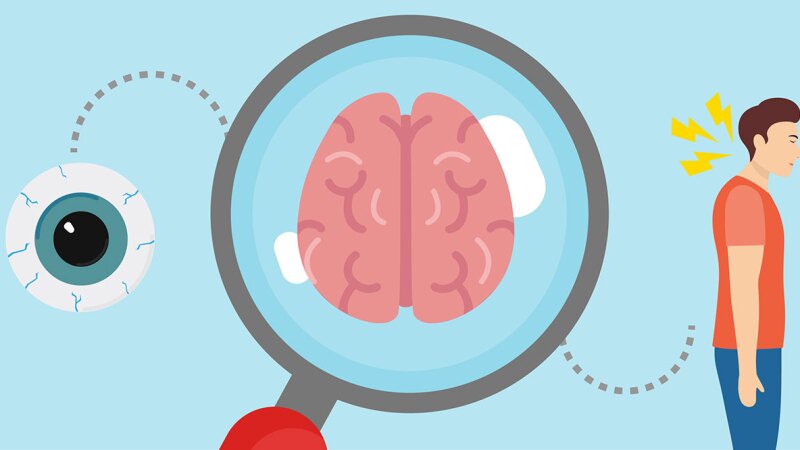When people hear the term multiple sclerosis (MS), they likely think of someone who’s struggling with movement and mobility.
But MS, a disease in which the immune system mistakenly attacks the central nervous system—the brain and spinal cord—can actually cause myriad other symptoms, from head to toe.
The condition most often surfaces between the ages of 20 and 40, and it is two to three times more common in women than in men. Although MS isn’t fatal, the exact cause of the disease is unknown. It’s also impossible to predict how MS will affect any single individual, but there are some common symptoms people may experience, ranging from vision problems to trouble walking.
For World MS Day, we asked Tatiana Scherz, M.D., Ph.D., Clinical Leader, Janssen Neuroscience, part of the Janssen Pharmaceutical Companies of Johnson & Johnson, to take us on a visual tour of what can happen throughout the body as MS takes its toll—and share what patients can do to live as normal and healthy a life as possible.
The brain and spinal cord: where symptoms typically start
MS starts when the immune system begins to attack the myelin sheath—the insulating material that protects the nerve cells of the central nervous system, explains Dr. Scherz. The attacks happen repeatedly and unpredictably, causing lesions of inflammation to form in the brain and spinal cord. The lesions then interrupt the flow of information between the brain and various parts of the body, causing symptoms.
Lesions in the brain may affect cognitive abilities. Some people with MS have trouble with memory, attention and concentration, multitasking and decision-making, says Dr. Scherz. The changes are usually mild at the beginning, but can be frustrating as time goes by.
MS may also cause emotional changes, such as decreased tolerance for stress and worsening anxiety and depression, either due to nerve fiber damage or simply the burden of dealing with the disease.
It’s not clear why, but Dr. Scherz says one theory is that lesions force the brain to find alternative ways to perform tasks, which requires more of the body’s energy. Lesions do occur in areas of the brain responsible for energy and alertness, she adds.
Vision changes are often one of the first MS symptoms. “It’s common that MS starts with an attack in the optic nerve, which sends visual information from the eye to the brain,” Dr. Scherz says. This happens because the optic nerve is close to the brain, and the myelin in the eye and brain is similar, she explains. People may experience blurred vision, double vision, eye pain or loss of color vision.
Difficulty articulating words or swallowing and slurred speech may occur if there’s damage to the area that controls the mouth and throat. “MS may lead to a loss of sensation in whatever area of the body corresponds with the damaged area of the brain or spinal cord,” Dr. Scherz says. This can cause numbness or a tingling sensation—for instance, in the fingers or toes. The feeling usually comes and goes, and can be mild or severe.
When a damaged nerve “short circuits,” it can cause a sharp pain or a burning or squeezing sensation. A common pain in MS is what’s known as Lhermitte’s sign. “This occurs when there’s a lesion on the cervical spine, the neck area of the spinal cord,” says Dr. Scherz. “When the person bends their neck, there’s mechanical irritation to the damaged nerve fibers, which can cause what feels like an electric shock.” People with MS may also experience muscle spasms, tremors and stiffness.
How nerve damage can impact organs
About 80% of people with MS have bladder issues, which may occur with nerve damage in the lower area of the spine.
“Symptoms may include frequent urination, trouble starting or maintaining a urine stream, an inability to empty the bladder or incontinence,” notes Dr. Scherz. Bowel problems—such as constipation, diarrhea or bowel incontinence—are also common.
And because the brain sends messages to the sexual organs through the spinal cord and vice versa, Dr. Scherz says damage anywhere along that path may cause sexual problems, including difficulty getting aroused, reduced sensation and trouble achieving orgasm.
Lesions in the parts of the brain responsible for coordination often lead to balance and coordination problems, which tend to begin in the legs and move to other parts of the body as the disease progresses. Muscle spasticity and weakness, stemming from fatigue or other symptoms, may also be to blame.
“People with MS may have difficulty walking, and in advanced stages, need a cane or wheelchair or to be bedridden,” Dr. Scherz says.
New hope for treatment options
Unfortunately, there’s no cure for MS. But there are treatments—ranging from oral medications to injections or infusions—that can help slow the progression of the disease, reduce the number of relapses and alleviate symptoms.
Some of those drugs work by suppressing the immune system, which may slow down MS and decrease relapses, but may also put patients at risk for infections and other illnesses, Dr. Scherz says. Depending on the drug, even after discontinuing the medication, it can take months for the immune system to bounce back.
This is why Dr. Scherz and her team at Janssen have been conducting ongoing research to better understand MS in the hopes of coming up with an improved intervention, as well as working to develop a compound that doesn’t cause prolonged or severe immune suppression.
“Our investigational treatment belongs to a class of reversible immunomodulators—it changes the way the immune system works without destroying immune cells,” explains Dr. Scherz. Instead, the investigational treatment holds immune cells in the lymph nodes so they can’t cross over into the central nervous system and destroy the myelin, but they still remain functional, so they can continue to fight off pathogens and infections.
“We’re working very hard to someday make this treatment a realistic option for patients throughout the world,” Dr. Scherz says.










